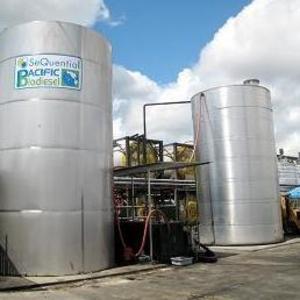SeQuential-Pacific produces 20 millionth gallon; teams up with UO

Photo: SeQuential-Pacific Biodiesel
August 28, 2013
BY SeQuential-Pacific Biodiesel
SeQuential-Pacific Biodiesel, the longest-running commercial biodiesel producer in the Pacific Northwest, announces the production of its 20 millionth gallon of clean-burning, locally produced fuel, a milestone in the company’s eight years of business in Oregon and Washington. This week, SeQuential-Pacific Biodiesel also announced an agreement to recycle cooking oil from the concessions stands operated by the University of Oregon athletics department. That oil will be used to make SeQuential-Pacific fuel, creating a closed-loop production cycle that yields an environmentally friendly product while also benefitting the local economy.
The University of Oregon joins more than 7,000 Northwest organizations in working with SeQuential-Pacific Biodiesel to recycle cooking oil. SeQuential-Pacific’s fuel is made from used cooking oil collected from local restaurants, businesses, hospitals and schools. These relationships help benefit the environment by diverting a waste stream—keeping used oil out of landfills or the sewer system—and by producing a cleaner-burning fuel. Biodiesel made from used cooking oil is significantly cleaner than petroleum diesel, emitting up to 78 percent less carbon dioxide and other harmful gases.
Advertisement
Recycling oil with SeQuential-Pacific Biodiesel also benefits the local business community by creating local fuel distribution channels. Biodiesel made by SeQuential-Pacific is sold to commercial and retail fuel distributors throughout Oregon and Washington. In fact, the company’s fuel is available for purchase at the SeQuential Biofuels stations in Eugene, Ore., just a few miles away from the UO campus.
“Oregon Athletics is committed to playing a leadership role in the university’s greening efforts,” said Craig Pintens, senior associate athletic director for marketing & public relations. “From individual offices to our complex of athletic venues, our staff, student-athletes, and supporters are making a difference for the environment. We are excited to be working with SeQuential-Pacific Biodiesel to ensure that the waste oil generated by our athletics concessions will be put to good use for the environment as well as for the community.”
Advertisement
SeQuential-Pacific’s relationship with the University of Oregon comes as the company’s production is at an all-time high. Since its founding in 2005, SeQuential-Pacific has set a production record each year, culminating in the 20 millionth gallon announced today. The company expects to produce more than 6 million gallons of biodiesel in 2013 alone.
“Twenty million gallons is a major milestone for us and a testament to the partnerships we work to foster between our team, our customers and the community,” said Tyson Keever, general manager for SeQuential-Pacific Biodiesel. “Our relationships are critical to what we do. We’re particularly excited about this agreement with the University of Oregon because it has already played a big role in shaping our story. Many of our founding members, including myself, are Oregon alumni and the idea behind this company was actually sparked while we were still in school. We look forward to adding the University to our network and continuing to work together to build a new model for fuel production.”
Founded in 2005, SeQuential-Pacific Biodiesel is a joint venture between SeQuential Biofuels of Oregon and Pacific Biodiesel of Hawaii. As the longest-running commercial biodiesel producer in the Pacific Northwest, SeQuential-Pacific is deeply committed to improving the environment and invigorating the local economy by providing a clean-burning, renewable fuel that is sustainably produced from regionally sourced feedstocks. SeQuential-Pacific makes its biodiesel from recycled cooking oil collected from thousands of restaurants and businesses throughout the region. Every drop of oil the company collects is turned into biodiesel that is then distributed back into the local community.
Related Stories
The U.S. Energy Information Administration maintained its forecast for 2025 and 2026 biodiesel, renewable diesel and sustainable aviation fuel (SAF) production in its latest Short-Term Energy Outlook, released July 8.
XCF Global Inc. on July 10 shared its strategic plan to invest close to $1 billion in developing a network of SAF production facilities, expanding its U.S. footprint, and advancing its international growth strategy.
U.S. fuel ethanol capacity fell slightly in April, while biodiesel and renewable diesel capacity held steady, according to data released by the U.S. EIA on June 30. Feedstock consumption was down when compared to the previous month.
XCF Global Inc. on July 8 provided a production update on its flagship New Rise Reno facility, underscoring that the plant has successfully produced SAF, renewable diesel, and renewable naphtha during its initial ramp-up.
The U.S. EPA on July 8 hosted virtual public hearing to gather input on the agency’s recently released proposed rule to set 2026 and 2027 RFS RVOs. Members of the biofuel industry were among those to offer testimony during the event.
Upcoming Events










